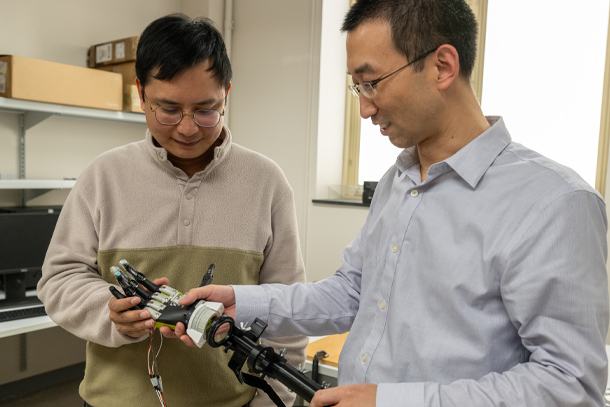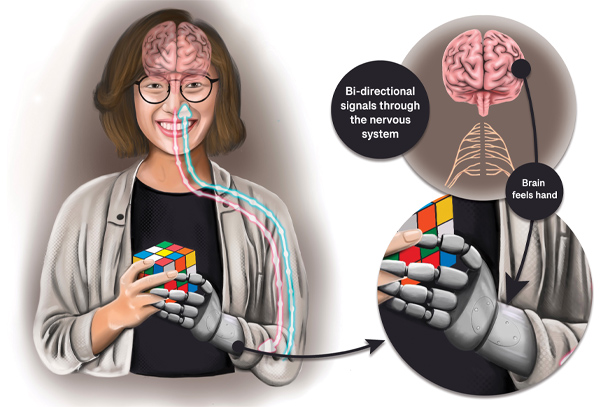
Xiaogang Hu (right), the Dorothy Foehr Huck and J. Lloyd Huck Chair in Neurorehabilitation and associate professor of mechanical engineering, will lead a $4 million grant from the U. S. National Science Foundation to make robotic prostheses more useful for people living with amputations. Long Meng (left), a postdoctoral scholar in Hu's lab, will participate in the research. Credit: Kate Myers/Penn State
$4M grant funds project to make robotic prostheses more like biological limbs
February 2, 2024
By Mariah R. Lucas
UNIVERSITY PARK, Pa. — Prosthetic hands that incorporate robotics can perform dexterous self-care tasks, but they are often hard to operate, requiring a user’s constant attention with a limited number of hand functions. With a five-year, $4 million U.S. National Science Foundation grant, Penn State researchers aim to make robotic prostheses more useful for people living with amputations.
The interdisciplinary team, led by Xiaogang Hu, the Dorothy Foehr Huck and J. Lloyd Huck Chair in Neurorehabilitation and associate professor of mechanical engineering and kinesiology, will work on making powered prosthetic hands more intuitive for the user by improving the neural and cognitive processes behind human-robot interactions.
“Our research seeks to reduce the barrier for assistive technology adoption and improve the quality of life for individuals with physical disabilities by improving the technology behind prosthetic robots,” Hu said. “The resulting advances in assistive robotics will allow users to engage with their prostheses as if they are their own biological limbs, allowing them to play the piano, type or handle delicate objects.”
In the project’s first phase, led by Nanyin Zhang, the Dorothy Foehr Huck and J. Lloyd Huck Chair in Brain Imaging and professor of biomedical engineering and of electrical engineering, researchers will investigate how neural and cognitive processes behind daily tasks are represented in the brain. To do this, they will develop an electrode platform to measure sensory information in a rodent model.
“We will seek to understand how sensory information, like reaching or grasping, are represented in the brain, and use it to help us reengineer it in robotic parts to deliver artificial sensations back to the brain,” Zhang said.

Researchers will address bidirectional communication and feeling between users and robotic prostheses. Credit: Parisa Farjamfar/Penn State
Using the information gained through the electrode implants, researchers plan to develop a device that sits at the skin’s surface and stimulates the nerves so that a user can “feel” their missing hand, in the form of the neuroprostheses. Huanyu “Larry” Cheng, the James L. Henderson, Jr. Memorial Associate Professor of Engineering Science and Mechanics, will lead the device’s development.
The researchers will test the robustness and adaptability of this prosthetic device by training a sensory feedback system, a process that will be led by Robert Sainburg, the Dorothy F. and J. Lloyd Huck Distinguished Chair in Kinesiology and Neurology in the College of Health and Human Development. Sainburg’s team will evaluate how the smart prosthetic will help patients perform tasks in daily life.
“We believe that our plan for mapping both motor output and sensory feedback will make control intuitive for people with amputated hands and should make their motor output robust and adaptive to unexpected changes in the environment,” Sainburg said.
In addition to Hu, Zhang, Cheng and Sainburg, Katie Fitzsimons, assistant professor of mechanical engineering; Michele Diaz, professor of psychology, linguistics and neuroscience in the College of the Liberal Arts; and John M. Roberts, surgeon for Penn State Health, will collaborate on the grant.
Hu, Zhang and Cheng are members of Penn State’s Center for Neural Engineering, an interdisciplinary research group that addresses theoretical, computational, experimental, clinical and instrumentation challenges in brain science, from the single cell to the entire human nervous system.



